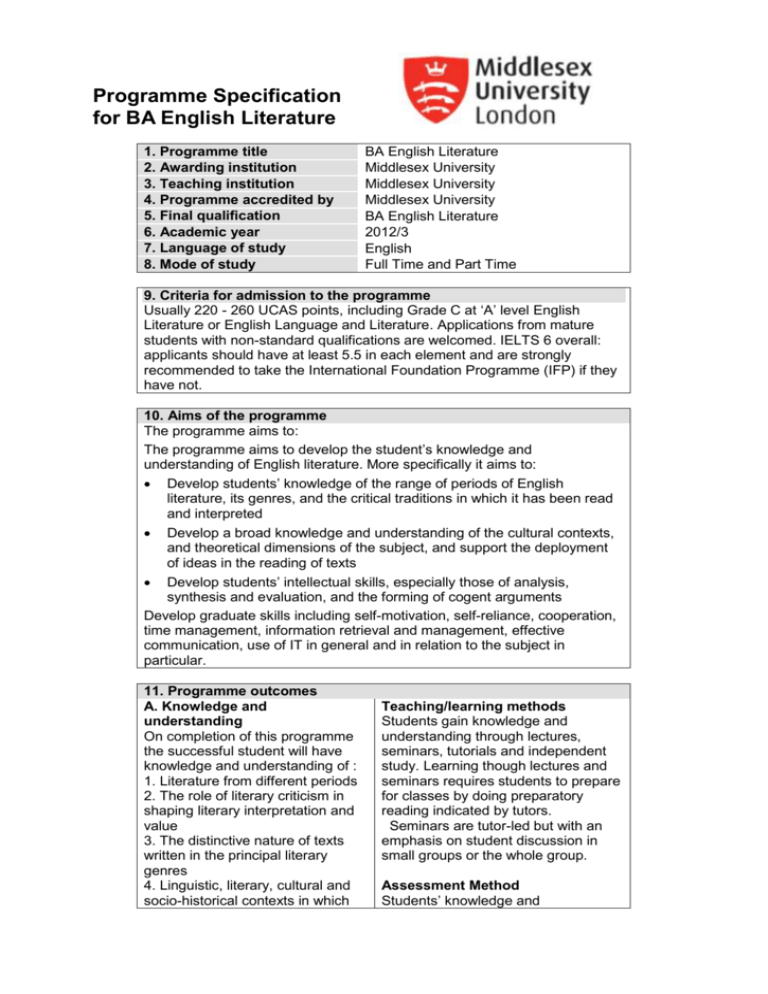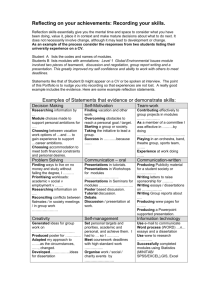for BA English Literature
advertisement

Programme Specification for BA English Literature 1. Programme title 2. Awarding institution 3. Teaching institution 4. Programme accredited by 5. Final qualification 6. Academic year 7. Language of study 8. Mode of study BA English Literature Middlesex University Middlesex University Middlesex University BA English Literature 2012/3 English Full Time and Part Time 9. Criteria for admission to the programme Usually 220 - 260 UCAS points, including Grade C at ‘A’ level English Literature or English Language and Literature. Applications from mature students with non-standard qualifications are welcomed. IELTS 6 overall: applicants should have at least 5.5 in each element and are strongly recommended to take the International Foundation Programme (IFP) if they have not. 10. Aims of the programme The programme aims to: The programme aims to develop the student’s knowledge and understanding of English literature. More specifically it aims to: Develop students’ knowledge of the range of periods of English literature, its genres, and the critical traditions in which it has been read and interpreted Develop a broad knowledge and understanding of the cultural contexts, and theoretical dimensions of the subject, and support the deployment of ideas in the reading of texts Develop students’ intellectual skills, especially those of analysis, synthesis and evaluation, and the forming of cogent arguments Develop graduate skills including self-motivation, self-reliance, cooperation, time management, information retrieval and management, effective communication, use of IT in general and in relation to the subject in particular. 11. Programme outcomes A. Knowledge and understanding On completion of this programme the successful student will have knowledge and understanding of : 1. Literature from different periods 2. The role of literary criticism in shaping literary interpretation and value 3. The distinctive nature of texts written in the principal literary genres 4. Linguistic, literary, cultural and socio-historical contexts in which Teaching/learning methods Students gain knowledge and understanding through lectures, seminars, tutorials and independent study. Learning though lectures and seminars requires students to prepare for classes by doing preparatory reading indicated by tutors. Seminars are tutor-led but with an emphasis on student discussion in small groups or the whole group. Assessment Method Students’ knowledge and literature is written and read 5. The variety of critical and theoretical approaches to literary study 6 How literature produces and reflects cultural change and difference understanding is assessed by coursework essays, unseen and seen examinations, project-work B. Cognitive (thinking) skills On completion of this programme the successful student will be able to: Teaching/learning methods Students learn cognitive skills through lectures, seminars, tutorials and independent study, in particular Reading Discussion of the key issues raised in every component of the course Practice in applying concepts and analysis, both orally and in writing The analysis and interpretation of texts Preparing written assignments. 1. Deploy skills in the close reading and analysis of texts, and in reviewing their concepts 2. Articulate knowledge and understanding of texts, concepts and theories relating to English studies at an abstract level 3. Articulate how different social and cultural contexts affect the nature of language and meaning 4. Think and judge independently and critically 5. Understand, interrogate and apply a variety of theoretical positions and weigh the importance of alternative perspectives C. Practical skills On completion of the programme the successful student will be able to: . Use bibliographic skills, including accurate citation of sources and consistent use of conventions in the presentation of scholarly work 2. Demonstrate advanced literacy and communicative skills, including the ability to present sustained and persuasive written and oral arguments 3. Show competence in the planning and execution of essays and project-work 4. Demonstrate research skills, including information retrieval, organisation and critical evaluation. Assessment Method Students’ cognitive skills are assessed by Written work which will be evaluated with regard to the coherence of the topic treated; the appropriateness of the approach adopted; evidence of critical and independent discussion. Seminar discussions and tutorials, where attention will be given to analytical skills, and which will provide feedback on progress. Teaching/learning methods Students learn practical skills through Transferable skills being embedded in level 1 modules and beyond Writing essays and projects Participating in seminars and tutorials Seminar and tutorial guidance on the research and planning of coursework Preparing written assignments. Assessment Method Students’ practical skills are assessed by The written component of essays and project-work Unseen and seen examinations D. Graduate Skills On completion of this programme the successful student will be able to: 1. Reflect on personal and career development 2. Engage in effective learning 3. Communicate effectively 4. Work in teams 5. Display information technology skills Teaching/learning methods Students acquire graduate skills through Transferable skills being embedded in level 1 modules and beyond The teaching and learning of individual modules Seminars, tutorials, independent study Assessment method Students’ graduate skills are assessed by Coursework essays, unseen and seen examinations and project-work 12. Programme structure (levels, modules, credits and progression requirements) 12. 1 Overall structure of the programme At level 1 of their studies students take ELS1301, Critical Reading, which includes understanding literary concepts and close reading, and the critical reading of texts in relation to criticism and contexts. ELS1302 develops the skills of close reading in relation to historical and contemporary literature in different genres. ELS1305 The Romantic Moment engages students in developing close textual analysis, comparative and contrastive analysis, identifying and representing argument structures and other rhetorical practices. CMW1001, Introduction to Writing: Fiction and Poetry, complements critical work with creative writing in two genres, and develops self-reflection on the process. Key skills are embedded in all level 1 modules. Level 1 ELS and CMW modules overall provide a range of literature from different historical periods. Students pass to level 2 study which is structured as a series of 4 modules. Three of the four level 2 modules cover different genres of literature from particular historical periods, and consider questions of context, criticism and interpretation, and periods covered are the Renaissance, the long nineteenth century, and the twentieth century to the present day. ELS2304, Literature in a Media Age: Cultural Value / Cultural Change, explores the relations between books and other media, in particular, film, television and various types of journalism. Level 2 modules build on the knowledge and skills learned at level 1. Level 3 modules represent a further stage of progression of study from level 2 modules as each is more specialised in range and subject matter and offers more explicit consideration of theory as well as context and criticism. Students will complete their programme by taking 3 taught modules and the proposition module. Taught modules are ELS3301, Shakespeare and Renaissance Drama, ELS3302, Literature and Otherness: Empires and Animals 1880 to the Present’, ELS3303, Gender, Violence, and the Postmodern. In the Proposition modules students engage in guided research, after having training, and being tested, in research methods. 12.2 Levels and modules Starting in academic year 2010/11 the University is changing the way it references modules to state the level of study in which these are delivered. This is to comply with the national Framework for Higher Education Qualifications. This implementation will be a gradual process whilst records are updated. Therefore the old coding is bracketed below. Level 4 (1) COMPULSORY OPTIONAL PROGRESSION REQUIREMENTS Students must take all of the following: 120 credits at level 1 ELS1301 Critical Reading ELS1302 Reading Contemporary Literature ELS1305 The Romantic Moment CMW1001 Introduction to Writing A: Fiction and Poetry Level 5 (2) COMPULSORY Students must take all of the following: ELS2301 Renaissance Literature ELS2302 Literature in the Long Nineteenth Century ELS2303 TwentiethCentury Literature ELS2304 Literature in a Media Age Level 6 (3) COMPULSORY OPTIONAL Students must also choose at least XX from the following: OPTIONAL PROGRESSION REQUIREMENTS 120 credits at level 2 PROGRESSION REQUIREMENTS Students must take all of the following: 120 credits at level 3 ELS3301 Shakespeare and Renaissance Drama ELS3302 Literature and Otherness: Empires and Animals 1880 to the Present ELS3303 Gender, Violence, and the Postmodern ELS3304 Proposition Module 12.3 Non-compensatable modules (note statement in 12.2 regarding FHEQ levels) Module level Module code ELS3304 Proposition Module 13. A curriculum map relating learning outcomes to modules See Curriculum Map attached 14. Information about assessment regulations n/a 15. Placement opportunities, requirements and support (if applicable) Standard Middlesex University regulations apply 16. Future careers (if applicable) English is recognised as a premier degree providing an excellent basis for careers in media, journalism, administration and management, public services. Its knowledge content can be used directly in careers in primary, secondary and tertiary education, publishing and media, as well as in postgraduate study and research. 17. Particular support for learning (if applicable) A Royal Literary Fund Fellow is attached to the School of Arts and Education whose main mission is to support expository writing: essays, dissertations, etc. Students have one-to-one meetings with the Fellow. 18. JACS code (or other relevant coding system) 19. Relevant QAA subject benchmark group(s) Q300 T BA/English English 21. Other information Indicators of Quality 2008 RAE result for English Language and Literature Unit of Assessment was 80% of research at the internationally significant level or above Members of ELS have in the last 10 years won research finding from Leverhulme Trust, and Arts and Humanities Research Board (AHRB). Please note programme specifications provide a concise summary of the main features of the programme and the learning outcomes that a typical student might reasonably be expected to achieve if s/he takes full advantage of the learning opportunities that are provided. More detailed information about the programme can be found in the student programme handbook and the University Regulations.




